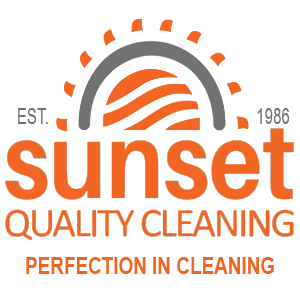Sunset QC Cleaning Guidelines
Have you ever wondered what goes into professional-level cleaning? For all our tips and guidelines, read the sections below:
Carpet care & industrial carpet cleaning
• Vacuuming must be done thoroughly; we use a vacuum hose and attachments as needed to remove salt crystals and de-icing agents completely, or any other debris like paper clips, etc.
• We vacuum along baseboards, behind doors and under desks regularly – dust accumulates along baseboards if not done with an attachment hose. We pick up paper clips or embedded staples by hand. Chewing gum in the carpets has to be removed with the appropriate chemical.
• Any carpet spills need to be cleaned regularly using proper equipment.
• Vacuum cleaner must be in good working order (we replace the vacuum bag before it gets too full or when we notice a bad odour; we wipe the vacuum and cord clean on a regular basis; during vacuuming we avoid pulling at a cord from a distance or getting it jammed under the door – this damages the cord, the plug and creates an electrical hazard).
Floor cleaning
• Having a full bucket of hot water and frequently changing the water is the key to achieving a well-cleaned floor. Often it is the case of using an overly wet mop if streaks appear when dry. We check the floor after it is dry. We use the correct floor detergent to remove salt film/grease if necessary.
• We rinse/disinfect and wring the mop head and hang it in such a manner as to allow for complete drying of the mop strings.
• Dirty mops are often connected with general poor performance in cleaning.
• We change the dust-mop heads regularly before they get too dirty with dust. Our dust-mops are treated to effectively remove any dust from floors.
• A clean dust mop is a must to sweep floors properly.
Dusting
• We replace your dusters and sweeping brooms at the first sign of wear and tear – not only do tools in disrepair look unprofessional, but they don’t work.
• We supply longer dusters for hard-to-reach areas and cobwebs in high places. We dust all surfaces on a regular basis, not forgetting backs of chairs, legs of chairs and tables, baseboards, behind computer screens, PC cables etc.
Extra care
• When cleaning surfaces, we give extra attention to clean/disinfect high contact areas (switch plates, doorknobs and plates, door frames, faucet handles, soap dispensers, walls under sinks and under paper towels dispensers, baseboards in washrooms, wall areas around trash cans and trash cans). We wipe desks clean and streak free, disinfect telephones weekly. We wipe cabinetry in kitchens and washrooms on a regular basis.
Glass partitions and desks
• We have noticed that finger prints, smudges and streaks are often missed on glass partitions, glass sections on doors, desks etc. To achieve spotless glass a good clump of paper has to be used when wiping off Windex, not just a little piece. It is the cleaner’s responsibility to clean the film on glass partitions that develops over the time. Besides Windex, lightly dampened micro fiber cloth is the best for cleaning such surfaces. Some office furniture cannot be cleaned with Windex. It could damage its surfaces when used often.
Often forgotten places
• Some janitorial providers forget to vacuum carpets behind doors or clean toilet divider doors from inside. Cleaning behind the toilets and bases of toilets is a must! Accumulation of calcium around faucets and drains is a frequent concern as well as vacuuming of ceiling vents in bathrooms. Calcium/hard salt removing cleaning agents need to be used. These items are part of regular clean-up duties! Streaks on stainless steel surfaces are also a frequent issue. The best method is often just a very squeezed-clean micro fiber cloth for many surfaces and applications.
Janitor’s closet
• Keeping the janitor’s closet organized and clean is necessary for a professional look and for maintaining standards of hygiene. We always dump the water and rinse the bucket for the next cleaning.
Insects
• We keep window ledges, baseboards, corners, and all areas clear of spider webs or dead bugs. Dusting spider webs often does not work if the insect is not killed in the process. Spiders build new webs in 24 hours and customers complain about dusting not being done. Windex kills spiders but spider pesticide is the best.
• Ants are often a problem and vacuuming/cleaning along walls helps eliminate this problem, especially where food is present.
Remember:
It is clean or not clean…there is nothing in between!
